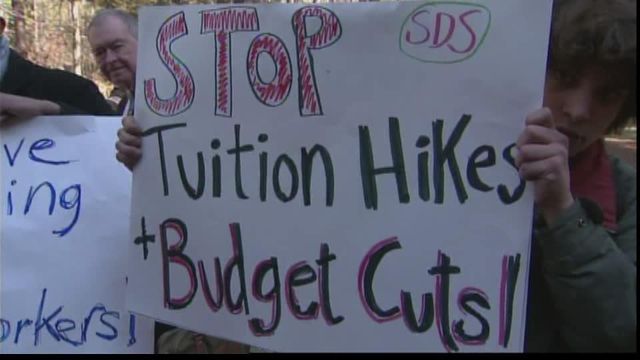UNC system begins tuition discussions
Leaders of public universities in North Carolina on Thursday began a months-long process to decide whether students will pay more tuition in the coming year.
Posted — UpdatedThe Board of Governors of the University of North Carolina system met to begin discussions on possibly allowing exceptions to a 6.5 percent cap on annual tuition and fee increases, which was put in place several years ago.
"We need to be sure above all else that we have access and affordability, but (that) we also have excellence," UNC President Tom Ross said.
The leaders of some universities have indicated they might seek tuition hikes above the cap. Talk of tuition increases comes after the 17-campus system lost $414 million, or 15.6 percent, of its funding in the most recent state budget.
Some Board of Governors members said they needed to send a message to campuses as to whether large tuition increases would be accepted.
"It's sort of disingenuous of this board to say, 'Yeah, we've opened it up, and you can catch up and all that,' if we are really not going to entertain their proposals," board member Peaches Blank said.
Other board members angrily pointed the finger at the General Assembly, saying lawmakers aren't fulfilling the state's obligation to support higher education.
"What if, for example, everybody came back and said, 'You know what, we are not raising (tuition) a nickel, and here is what it takes to maintain the quality, now you (lawmakers) deal with it,'" board member Fred Eshelman said.
Ross persuaded the board to hold off on taking any positions on hefty tuition increases until campuses can put together their formal proposals.
"We've got to do more analysis of this," he said. "We're a long way off from any decisions being made."
The Board of Governors isn't expected to vote on any tuition proposals until after February. All tuition increases must be approved by trustees of the individual schools, the Board of Governors and state lawmakers before taking effect.
Although UNC campuses have been squeezed by the state budget cuts – courses offerings are down and class sizes are up – Ross said tuition has never been seen as the primary source of funding for North Carolina universities.
"We have to make our case for an investment, and that's really what higher education is, it's an investment that the state makes in our future," he said. "We've had a very good and long history in North Carolina of state support, and I don't think the mentality to support the university is any different now than it's always been."
A special UNC-Chapel Hill task force is expected to vote sometime in November on a proposal to raise tuition and fees for in-state students by up to $2,800, which would be a 40 percent increase. The increase would likely be spread over a few years.
"You are hearing talk of going above the 6.5 percent, and I think that's probably going to be necessary," Chancellor Holden Thorp said.
Students said they hope Thorp and other UNC officials think twice before implementing a major tuition increase.
"I hope they really think about what's going on and if it's necessary," sophomore Diana Castana said.
"It's a dramatic change that I think too many students aren't aware of," junior David Freifeld said.
North Carolina State University officials are considering adding $330 to in-state undergraduate tuition – a 6.4 percent increase – but could go higher if given approval, officials said.
"If the state is not able to fund higher education the way they have in the past, we are going to look at the balance between state funding and student funding," N.C. State Chancellor Randy Woodson said.
North Carolina Central University will likely issue its tuition proposal in December.
Appalachian State University student Atul Bhula, the student representative on the Board of Governors, said he's seeing more students quit school and go to work to save money to come back, because they can no longer get the financial aid they need.
"I'm afraid that if they do raise tuition by a certain amount, then we are going to see a lot more students dropping out," said Bhula, president of the UNC Association of Student Governments.
The Board of Governors also is looking at cutting costs by eliminating redundant programs at various campuses. Jim Woodward, the retired chancellor of UNC-Charlotte, examined the issue in recent months and told the board Thursday that program duplication isn't a problem for the UNC system.
At least a quarter of the money generated by tuition increases would be used for financial aid.
Campuses have added more programs than they have discontinued over the past decade, Woodward said, but many of the new fields are tied to economic development.
He advised the board to look at expanding online programs that would allow students on one UNC campus to take courses on another. He also said the UNC system needs to review the mission of each campus, which hasn't been done in 20 years.
• Credits
Copyright 2024 by Capitol Broadcasting Company. All rights reserved. This material may not be published, broadcast, rewritten or redistributed.






